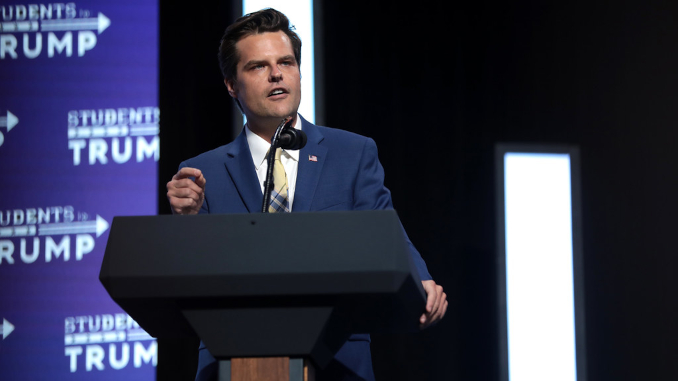
By José Niño
Since the end of the Cold War, the Republican Party has seen various insurgent dissident factions emerge to challenge its prevailing leadership structure.
Click the Link Below to Listen to the Audio of this Article
Patrick Buchanan, the speech writer for former President Richard Nixon, ran presidential campaigns in 1992 and 1996, ostensibly challenging the Republican establishment. Buchanan positioned himself as a champion of foreign policy restraint, economic protectionism, immigration restriction, and traditional values—policy items that stood in stark contrast to the neoconservative playbook of perpetual foreign policy interventionism abroad, mass migration, and centrism on social issues.
Although Buchanan’s presidential runs proved to be unsuccessful, he paved the way for credible dissident forces on the right to rise up and take on party leadership. Former Rep. Ron Paul subsequently capitalized on growing discontent among grassroots conservatives by running on an unapologetically libertarian platform during his Republican presidential runs in 2008 and 2012.
To distinguish himself from his neocon rivals on the campaign trail, Paul placed a major emphasis on a non-interventionist foreign policy, the establishment of a sound monetary system, and a wholesale reduction of the federal government.
Like Buchanan, Paul’s presidential bids proved to be unsuccessful. That said, the discontent that undergirded the Buchanite and Paulian movements never fully dissipated. The economic malaise that followed the global financial crisis of 2008 coupled with growing cultural tensions laid fertile ground for an even larger anti-establishment sentiment to foster within the broader conservative base of the Grand Old Party (GOP).
When Donald Trump descended a golden escalator in Trump Tower on June 16, 2015, the American political system experienced a shock like no other. Trump ended up doing the unthinkable after defeating Hillary Clinton in the 2016 presidential election by sticking to his three-pronged populist platform of ending foreign policy quagmires, clamping down on mass migration, and instituting a protectionist economic agenda.
Politics is a nasty beast, though. Politicians will shower their supporters with lofty promises on the campaign trail to later disappoint once in office. Trump was no exception to this trend as his administration was mired by bad hires such as John Bolton as national security advisor and Mike Pompeo as secretary of state, among others. Despite not being able to fully implement his America-first agenda, Trump was able to score some solid victories by imposing tariffs on China and reducing immigration through his use of the public charge rule that largely expelled migrants on the public dole.
One of the more important developments of Trump’s time in office was the fissure that he created within the Republican Party. As Trump’s anti-establishment agenda became normalized in GOP political circles, several elected officials, such as Rep. Andy Biggs (R-Ariz.), Rep. Paul Gosar (R-Ariz.), and Rep. Matt Gaetz (R-Fla.), have positioned themselves as the America-first alternatives to the neocon standard-bearers, such as Rep. Dan Crenshaw (R-Texas), Sen. Lindsey Graham (R-S.C.), and Sen. Marco Rubio (R-Fla.), by opposing mass migration, reckless military expeditions abroad, and the “woke” cultural agenda pursued by Democrats.
Other elected officials, including Rep. Marjorie Taylor Greene (R-Ga.), have stirred the pot by challenging the uniparty’s regime-change venture in Ukraine. These efforts have currently culminated in the U.S. House’s refusal to approve a bill featuring $50 billion in military aid to Ukraine as long as border security issues remain unaddressed.
Such behavior would have been unheard of in the Republican Party of George W. Bush, which was completely on the neocon plantation.
While genuine America-first nationalists will aim to restrict immigration and decouple trade with China, there’s now a tendency among Republicans to pursue a great power conflict with the East Asian giant.
Even more concerning is the GOP’s blind support for the state of Israel—a long-standing trend that unites virtually all factions of the GOP—in its punitive military expedition against Gaza. Save for Rep. Thomas Massie (R-Ky.), who has remained consistently non-interventionist on all foreign policy conflicts, the GOP still has residual elements of interventionism within its ranks.
There’s still hope, however. Younger generations of Republicans are beginning to question many of the foreign policy precepts of yesteryear. This has freaked out the likes of Jonathan Greenblatt, the CEO of the Anti-Defamation League, who was recently caught in a leaked phone call expressing his alarm by Generation Z’s growing anti-Zionist sentiments.
The proliferation of alternative media has created a vehicle for anti-system thoughts to be spread on a massive scale. These ideas simply can’t be contained. The cat is out of the bag with growing numbers of websites and public figures emerging to counter a dying legacy media.
As long as nationalist ideas can be freely spread and nationalists can politically organize, neoconservatism’s traditional iron grip on the Republican Party will not be long for this world. It’s up to the current generation of America-first nationalists to continue pushing to make their policy visions a reality.
José Niño is a freelance writer based in Austin, Texas. You can contact him via Facebook and Twitter. Get his e-book, The 10 Myths of Gun Control at josealbertonino.gumroad.com. Subscribe to his “Substack” newsletter by visiting “Jose Nino Unfiltered” on Substack.com.





